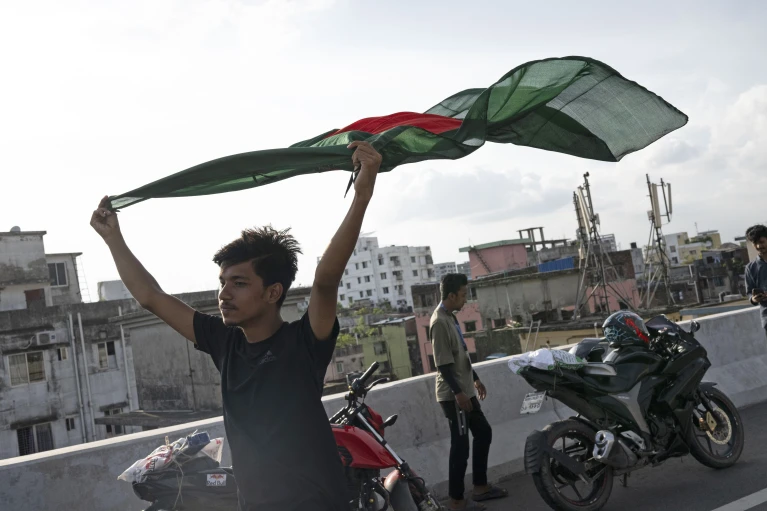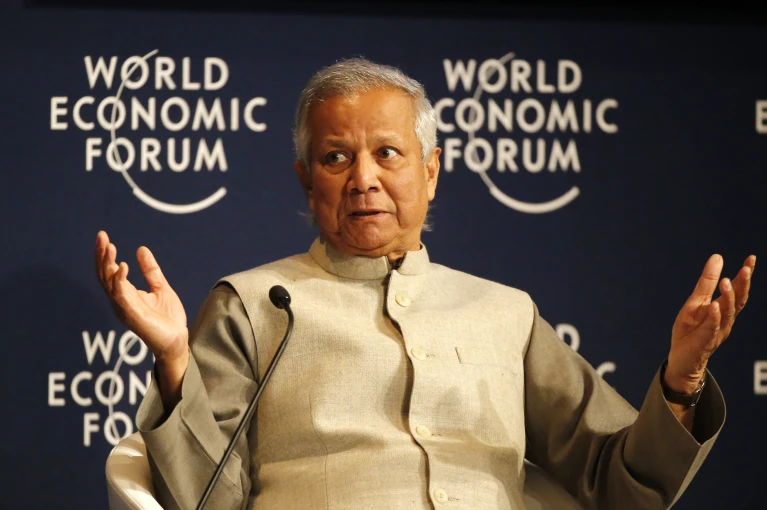
Nobel laureate Muhammad Yunus will lead Bangladesh’s interim government following the ousting of Hasina amid recent unrest.
On August 7, 2024 by editor1 StandardDHAKA, Bangladesh (AP) — Nobel laureate Muhammad Yunus will lead Bangladesh’s interim government following the departure of longtime Prime Minister Sheikh Hasina amid widespread unrest that resulted in numerous deaths and severe disruptions in the country.
The announcement, made early Wednesday by Joynal Abedin, press secretary to the country’s ceremonial President Mohammed Shahabuddin, was made during a high-level meeting with military leaders, student protest organizers, business figures, and civil society representatives. Yunus, a prominent critic of Hasina, is expected to return soon from Paris, where he is currently advising Olympic organizers.
Yunus, an economist and banker who won the 2006 Nobel Peace Prize for his work with microcredit through Grameen Bank, has been praised for his efforts to reduce poverty. The composition of the new government will be determined in the coming days following consultations with political parties and stakeholders, Abedin said. The president had previously dissolved Parliament, paving the way for an interim government and new elections.
Additionally, Shahabuddin ordered the release of opposition leader Khaleda Zia, who had been under house arrest. Zia, a long-time rival of Hasina, was convicted on corruption charges in 2018.
Dhaka saw a quieter day Tuesday following violent protests and unrest that led to Hasina’s abrupt departure. On Monday, demonstrators stormed the residence of the ousted leader and other properties linked to her party.
The Bangladesh Police Association went on strike after attacks on police stations and security officials across the country. The association reported fatalities among officers but did not specify numbers. It also apologized for its role in clashes with student protesters, claiming that officers were forced to use live ammunition.
Yunus, who had previously called Hasina’s resignation a “second liberation day,” had faced corruption charges under her administration, which he dismissed as politically motivated. Although he could not be reached for comment, protest leader Nahid Islam confirmed Yunus’s agreement to head the interim government.
Protesters plan to propose additional names for the Cabinet, and Islam suggested that those in power would need to heed their demands.
Hasina fled to India via helicopter as protesters defied a military curfew and marched towards the capital, eventually overrunning her residence and other related sites.
The unrest, which began in July over a controversial job quota system, evolved into broader protests against Hasina’s 15-year rule, marked by accusations of human rights abuses, corruption, and electoral fraud. The government’s harsh response to demonstrations, which resulted in around 300 deaths in a few weeks, further fueled the unrest.
The swift appointment of Yunus follows Hasina’s resignation and the subsequent power vacuum, with the military briefly stepping in. General Waker-uz-Zaman, the military chief, announced he was temporarily in control while a new government is formed.

Amid the celebrations, student Juairia Karim described the day as historic, saying, “Today we are getting what we deserve. Everyone is happy, everyone is cheerful.”
However, the country is grappling with the aftermath of the violence, which has seen some of the worst bloodshed since the independence war. The violence surrounding Hasina’s departure has led to at least 109 deaths, including 14 police officers, and hundreds of injuries. In Satkhira district, 596 prisoners escaped from a jail following an attack on the facility, according to reports.

There are concerns about potential attacks on the Hindu minority, which has previously been targeted during political unrest. The EU ambassador to Bangladesh, Charles Whitley, expressed concern over reports of violence against minorities.
Opposition leaders and student organizers have urged restraint and called for protection of minority groups.
Hasina, 76, had been re-elected for a fourth consecutive term in January, an election boycotted by her main opponents. The U.S. and U.K. criticized the election as not credible. After leaving Dhaka, Hasina arrived at a military airfield near New Delhi and met with Indian National Security Adviser Ajit Doval, with plans to travel to the United Kingdom.
Indian External Affairs Minister S. Jaishankar confirmed that Hasina requested permission to briefly enter India.
You may also like
Archives
Calendar
| M | T | W | T | F | S | S |
|---|---|---|---|---|---|---|
| 1 | ||||||
| 2 | 3 | 4 | 5 | 6 | 7 | 8 |
| 9 | 10 | 11 | 12 | 13 | 14 | 15 |
| 16 | 17 | 18 | 19 | 20 | 21 | 22 |
| 23 | 24 | 25 | 26 | 27 | 28 | 29 |
| 30 | ||||||
Leave a Reply